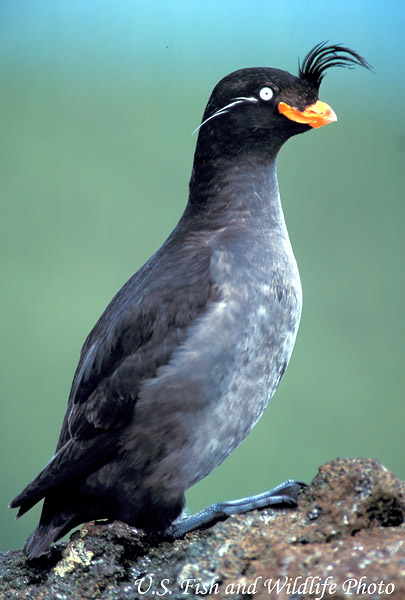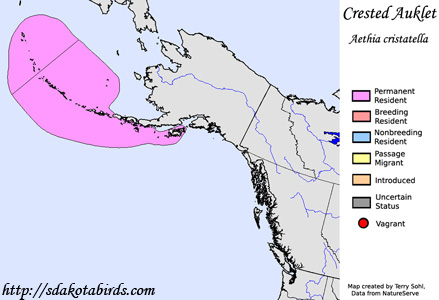| Length: 10.5 inches | Wingspan: 17 inches | Seasonality: Non-resident in South Dakota |
| ID Keys: Shaggy, multi-feather crest curling over the bill, dark plumage, white plume behind eye, orange bill | ||
 The
Crested Auklet is identifiable by the shaggy crested of feathers that
protrudes from the forehead and dangles over the bill. They are found
in the far North Pacific, nesting on rocky islands in the Aleutian Island
chain and in the Bering Sea. They are a common sight in much of their
historical range, far outnumbering the somewhat similar
Whiskered Auklet. Crested
Auklets are known for their unusual citrus-scented plumage.
The
Crested Auklet is identifiable by the shaggy crested of feathers that
protrudes from the forehead and dangles over the bill. They are found
in the far North Pacific, nesting on rocky islands in the Aleutian Island
chain and in the Bering Sea. They are a common sight in much of their
historical range, far outnumbering the somewhat similar
Whiskered Auklet. Crested
Auklets are known for their unusual citrus-scented plumage.
Habitat: Nests on rocky islands in the Aleutians and Bering Sea, as well as near Siberia. When foraging and outside of the breeding season, may be found well out to sea, or around upwelling currents near the coast.
Diet: Feeds on small crustaceans such as copepods, shrimp, and amphipods, as well as mollusks, fish, squid, and marine worms.
Behavior: Feeds by swimming underwater in search of prey, with dives as deep as 100 feet. Gregarious, with tightly formed flocks often seen flying around breeding colonies.
Nesting: The nest is a shallow scrape in the ground, or a layer of pebbles in a crevice or hollow in the rocks. The female lays a single egg, which is incubated by both parents. Both parents help to feed the young when it hatches.
Song: On their breeding Colonies, Crested Auklets have a variety of short calls, including a hoarse barking and a cooing call.
Migration: Considered a permanent resident in the southern part of their range, such as around the Aleutian Islands where open water exists all year. Populations nesting in the Bering Sea, where ice forms in the winter, move southward for the winter, with most wintering around the Aleutian Islands. They are only rarely found away from the far north Pacific, with a stray once found as far south as British Columbia. Birds that nest in Siberia winter in northern Japan.
Interactive eBird Map: Click here to access an interactive eBird Map of Crested Auklet sightings
Similar Species: Most likely species to be confused with the Crested Auklet is the Whiskered Auklet.
Conservation Status: Populations of Crested Auklet undoubtedly declined int eh 20th century, as introduced rats and foxes on their breeding islands reduced breeding success. However, despite population declines, the IUCN currently lists the Crested Auklet as a species of "Least Concern". They still are relatively common throughout their historical range.
Further Information: 1) Alaska Seabird Information Series - Crested Auklet
2) Audubon Guide - Crested Auklet
3) WhatBird - Crested Auklet
Photo Information: Photo is public domain image from U.S. Fish and Wildlife Service, taken in 2008 at Kiska Island in Alaska.
| Click below for a higher-resolution map |
 |
| South Dakota Status: Non-resident in South Dakota |
Additional Crested Auklet Photos (coming soon!!)
